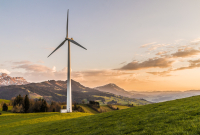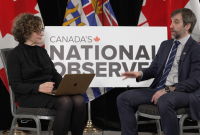Support strong Canadian climate journalism for 2025
In a world where climate pledges are often used as marketing ploys, a United Nations panel led by Catherine McKenna will try to push business investors and cities to back up vague commitments with credible plans.
“It is really critical that we have a lot more rigour” to ensure net-zero emissions announcements made by companies, investors, cities and regions are credible, said McKenna, who served as Canada’s minister of environment and climate change from 2015 to 2019.
On March 31, UN Secretary-General António Guterres announced McKenna will chair a 16-person expert panel to scrutinize the climate commitments of the private sector and municipalities that don’t report to the United Nations.
“You don't see a day go by without another company or industry saying, ‘We're going to be net-zero,’” McKenna said. “We really need to know that this is real … this will have a huge impact as to whether we will make 1.5 degrees or not.”
By the end of the year, the panel will make recommendations on the standards and definitions for setting net-zero targets, how to measure and verify progress, and ways to translate that into international and national regulations.
“It is critical to do this assessment because right now, it’s just not entirely clear when anyone makes an announcement what standard they're being held to,” McKenna told Canada’s National Observer. It’s increasingly common for companies, investors and cities to announce their intentions to achieve net-zero emissions by 2050 to help limit global warming to 1.5 C, but McKenna says commitments must be backed by robust plans.
“A lot of the announcements … don't have interim targets. You need interim targets, otherwise, you could just wait till 2049 — and we can't wait,” she said. “We need action now.
“The secretary-general is also very clear that he wants recommendations about what policies governments could put in place to ensure accountability,” she said.
The panel will not assess individual companies, rather, it will seek to achieve “higher ambition and environmental integrity” in terms of standard-setting, measurements, transparency and other key pieces of a strong climate pledge, said McKenna.
This means initiatives must clearly define what “net-zero” emissions means, she said. For example, an oil company’s net-zero pledge might only count emissions produced from the extraction and shipment of the oil and ignore the carbon emitted when the oil is eventually burned. McKenna believes these so-called Scope 3 emissions should be included in credible net-zero pledges, but said the panel will decide.
“How much are you doing yourself versus how much are you buying offsets or relying on carbon capture?” McKenna asked. “Are you going to be reporting in a transparent way so that you can benchmark against others? How will you be held accountable?”
Another important piece is to have interim targets to show how the ultimate goal of net-zero emissions by 2050 will be reached.
All these questions and more will be discussed by the panel, McKenna said.
The panel also includes prominent Australian climate scientist Bill Hare, South Africa-based sustainable finance expert Malango Mughogho and the former longtime governor of the People’s Bank of China, Zhou Xiaochuan.
— With files from The Associated Press
Natasha Bulowski / Local Journalism Initiative / Canada’s National Observer







Comments
"'It is really critical that we have a lot more rigour” to ensure net-zero emissions announcements made by companies, investors, cities and regions are credible."
That's rich! How about net-zero announcements made by Canada's Liberal government?
"Are you going to be reporting in a transparent way so that you can benchmark against others? How will you be held accountable?"
Canada's O&G industry was grossly under-reporting its emissions when McKenna took office. And Canada's O&G industry was grossly under-reporting its emissions when McKenna left office.
So much for transparent reporting.
Will Ms. McKenna and the Liberals be held accountable for their climate failure?
What would Ms. McKenna of 2022 say to Env. Minister McKenna circa 2015 – 2019?
You know, the Env. Minister who supported new oilsands pipelines and LNG plants.
And why don't journalists ask her that question???
McKenna became infamous for her robotic recital of Liberal talking points.
McKenna staunchly defended the Trudeau government's plan to fail on climate.
McKenna peddled the Liberal lie that we need to boost fossil fuel production to fund the energy transition.
When the IPCC called for swift climate action, McKenna stalled for time:
"We are in a transition. So transitions don't happen overnight."
"The reality is this is a transition that is going to take decades."
"But the reality is people are still using oil and gas. We haven't gotten to the point that there isn't this demand for it."
McKenna redefined "transition away from fossil fuels". Transitions start by moving in the direction you wish to travel. Doubling down on fossil fuels takes us in the wrong direction.
When you're in a hole, stop digging.
"McKenna's bafflegab fails to counter that GHG targets keep being missed"
https://ipolitics.ca/2018/03/06/mckennas-bafflegab-fails-counter-ghg-ta…
With climate leaders like these, we don't need obstructionists.
Michael Harris: "… Although Trudeau and Environment Minister Catherine McKenna continue to say all the right things on the environment, their rhetoric is emptier than a limp balloon."
It was SJ Harper who told the world on Canada's behalf that 'nothing can be done about a warming world through setting targets or the just the force of political will' It's not going to happen. That humiliation was Davos 2010. And, then he let the tar sands expand way beyond 2 Million bbl/day. Don't try to say we'd be better off with a CPP 'Climate Action Plan' when they couldn't even get business to make a plan for cleaning up orphan oil wells.
I do not suggest we'd be better off with a CPP Climate Action Plan. Straw man.
Harper is not an excuse for Trudeau's failures.
Trudeau (2016): "There is growth to be had in the oilsands. They will be developing more fossil fuels while there's a market for it, while we transition off fossil fuels."
Trudeau (2017): "No country would find 173 billion barrels of oil in the ground and just leave them there."
How humiliating is that?
The Conservatives are upront and honest with Canadians about their intentions to fail on climate. Trudeau talks about climate leadership, but likewise plans to fail. Only his plan is based on deception.
Oilsands expansion in Trudeau's first 5 years (114 MMbpd) was only slightly slower than it was under Harper (127 MMbpd).
Conservatives generally deny the problem and reject the science. Petro-progressives like Trudeau, Notley, and Horgan claim to accept the climate change science, but still push pipelines, approve LNG projects, promote oilsands expansion, subsidize fossil fuels, and let fossil fuel interests dictate the agenda.
In fact, the federal Liberals and provincial NDP parties (AB and B.C.) have proven far more effective than the Conservatives in delivering on Big Oil's and Corporate Canada's agenda. Trudeau & Co. have persuaded many Canadians that we can both act on climate and double down on fossil fuels. Have our cake and eat it too.
Trudeau and Notley did something else Harper and Kenney could never do: lead progressives over the climate cliff. Many of their acolytes now embrace a form of climate change denialism.
Trudeau and Notley moved the ball on the Trans Mountain pipeline down to the ten-yard line. Their signal achievement was to "push country-wide support for pipelines from 40% to 70%." Something Harper, Scheer, O'Toole, and Kenney could never dream of doing.
Something is wrong with my web browser this morning. I was looking for National Observer, but I keep getting The Onion.